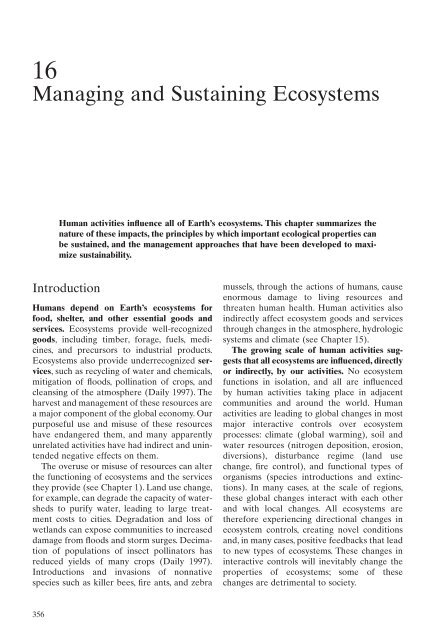Principles of terrestrial ecosystem ecology.pdf
Principles of terrestrial ecosystem ecology.pdf
Principles of terrestrial ecosystem ecology.pdf
Create successful ePaper yourself
Turn your PDF publications into a flip-book with our unique Google optimized e-Paper software.
16<br />
Managing and Sustaining Ecosystems<br />
Introduction<br />
Humans depend on Earth’s <strong>ecosystem</strong>s for<br />
food, shelter, and other essential goods and<br />
services. Ecosystems provide well-recognized<br />
goods, including timber, forage, fuels, medicines,<br />
and precursors to industrial products.<br />
Ecosystems also provide underrecognized services,<br />
such as recycling <strong>of</strong> water and chemicals,<br />
mitigation <strong>of</strong> floods, pollination <strong>of</strong> crops, and<br />
cleansing <strong>of</strong> the atmosphere (Daily 1997). The<br />
harvest and management <strong>of</strong> these resources are<br />
a major component <strong>of</strong> the global economy. Our<br />
purposeful use and misuse <strong>of</strong> these resources<br />
have endangered them, and many apparently<br />
unrelated activities have had indirect and unintended<br />
negative effects on them.<br />
The overuse or misuse <strong>of</strong> resources can alter<br />
the functioning <strong>of</strong> <strong>ecosystem</strong>s and the services<br />
they provide (see Chapter 1). Land use change,<br />
for example, can degrade the capacity <strong>of</strong> watersheds<br />
to purify water, leading to large treatment<br />
costs to cities. Degradation and loss <strong>of</strong><br />
wetlands can expose communities to increased<br />
damage from floods and storm surges. Decimation<br />
<strong>of</strong> populations <strong>of</strong> insect pollinators has<br />
reduced yields <strong>of</strong> many crops (Daily 1997).<br />
Introductions and invasions <strong>of</strong> nonnative<br />
species such as killer bees, fire ants, and zebra<br />
356<br />
Human activities influence all <strong>of</strong> Earth’s <strong>ecosystem</strong>s. This chapter summarizes the<br />
nature <strong>of</strong> these impacts, the principles by which important ecological properties can<br />
be sustained, and the management approaches that have been developed to maximize<br />
sustainability.<br />
mussels, through the actions <strong>of</strong> humans, cause<br />
enormous damage to living resources and<br />
threaten human health. Human activities also<br />
indirectly affect <strong>ecosystem</strong> goods and services<br />
through changes in the atmosphere, hydrologic<br />
systems and climate (see Chapter 15).<br />
The growing scale <strong>of</strong> human activities suggests<br />
that all <strong>ecosystem</strong>s are influenced, directly<br />
or indirectly, by our activities. No <strong>ecosystem</strong><br />
functions in isolation, and all are influenced<br />
by human activities taking place in adjacent<br />
communities and around the world. Human<br />
activities are leading to global changes in most<br />
major interactive controls over <strong>ecosystem</strong><br />
processes: climate (global warming), soil and<br />
water resources (nitrogen deposition, erosion,<br />
diversions), disturbance regime (land use<br />
change, fire control), and functional types <strong>of</strong><br />
organisms (species introductions and extinctions).<br />
In many cases, at the scale <strong>of</strong> regions,<br />
these global changes interact with each other<br />
and with local changes. All <strong>ecosystem</strong>s are<br />
therefore experiencing directional changes in<br />
<strong>ecosystem</strong> controls, creating novel conditions<br />
and, in many cases, positive feedbacks that lead<br />
to new types <strong>of</strong> <strong>ecosystem</strong>s. These changes in<br />
interactive controls will inevitably change the<br />
properties <strong>of</strong> <strong>ecosystem</strong>s; some <strong>of</strong> these<br />
changes are detrimental to society.


